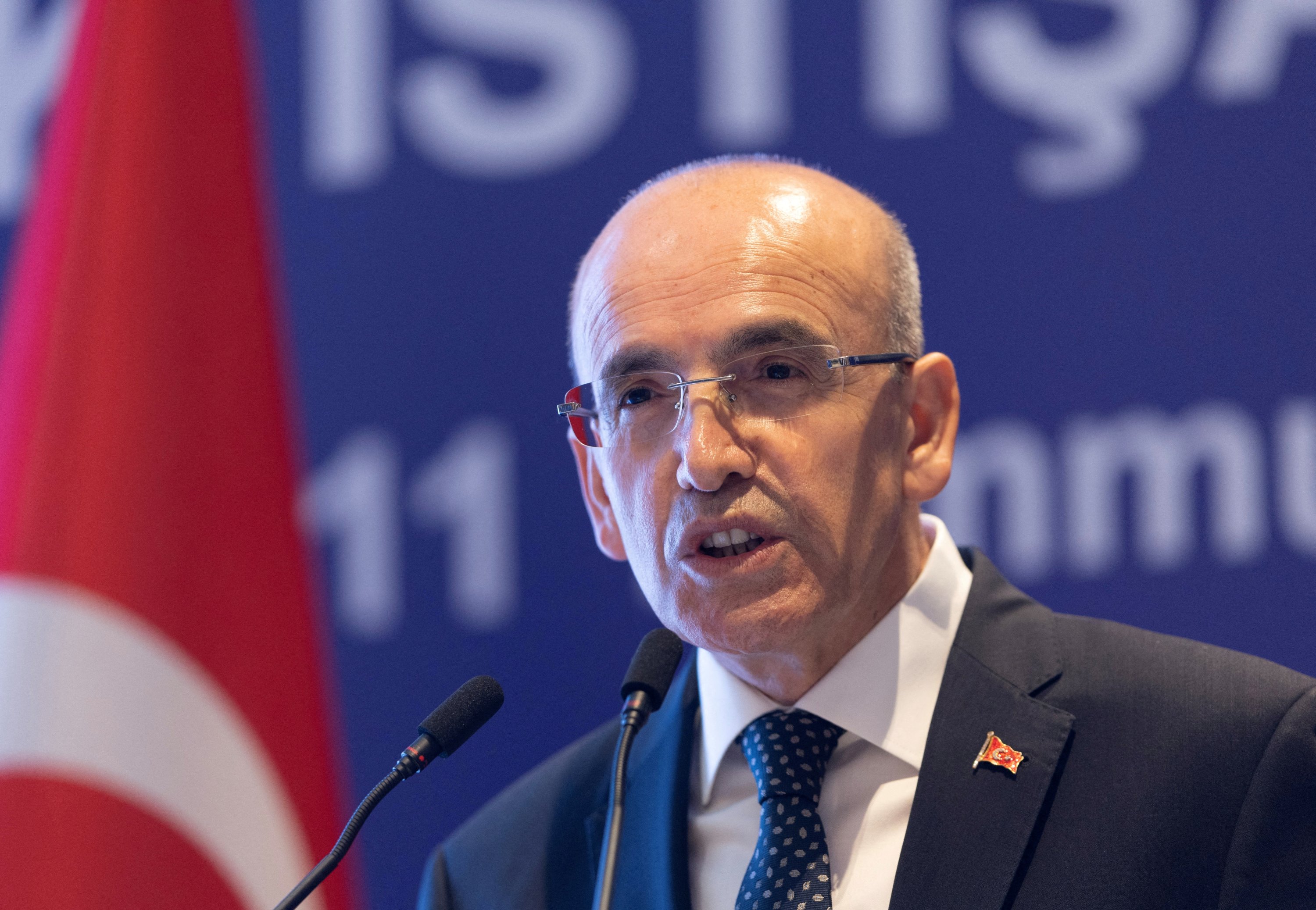© Turkuvaz Haberleşme ve Yayıncılık 2026
Türkiye's top economy officials told international investors on Tuesday that they do not expect lasting damage to the economy and would do whatever was needed to tame market turmoil following the arrest of Istanbul's mayor.
Police detained Mayor Ekrem Imamoğlu last Wednesday, and a court jailed him on Sunday pending trial on corruption charges, sparking a major market sell-off and sending the Turkish lira and bonds sharply lower.
Treasury and Finance Minister Mehmet Şimşek told investors that volatility in markets had significantly decreased and that he expects the effects on the economy to be temporary and limited, according to a press release by his ministry Tuesday.
Şimşek was accompanied by Central Bank of the Republic of Türkiye (CBRT) Governor Fatih Karahan during the call that was joined by around 4,500 investors from North America, the U.K., other European countries and the Middle East, the statement said.
Both officials pledged that further measures would be taken in the coming period if needed.
Şimşek told investors he would not comment on judicial matters and the events of the last two weeks, but said there would be no lasting impact on the economy and that he intended to stay in his post, two sources on the call told Reuters.
He also said there would be no change in approach to the economic turnaround program introduced in mid-2023, which saw authorities shift from years of ease policy to aggressive tightening aimed mainly at curbing stubborn inflation.
A statement from the Treasury and Finance Ministry cited Şimşek as saying that all necessary steps were taken as soon as possible for the healthy functioning and efficiency of the markets. He also emphasized that necessary steps would be taken in the coming period if needed.
He underscored that with the economic program, the resilience of the Turkish economy has increased, inflation is on a downward trend, the current account deficit has fallen to sustainable levels and fiscal discipline has strengthened.
Şimşek also stressed that the policies toward achieving price stability and structural transformation, which are the main objectives of the program, will continue with determination.

Karahan told the call that he sees the market turmoil as a temporary blip, one participant said. He also repeated something Şimşek had said earlier, that Türkiye will do "whatever it takes" to tame inflation, two sources said.
Participants said Şimşek added that the Treasury could reduce bond issuance as part of its response and that it also had the option of so-called foreign exchange-linked bonds, which give buyers some protection against big currency swings.
The minister also said he expected Türkiye to benefit from better bilateral relations with the United States. Later on Tuesday, Foreign Minister Hakan Fidan met U.S. Secretary of State Marco Rubio in Washington.
Veteran emerging market analyst Tim Ash at fund manager BlueBay said the call, which also detailed how "offshore" investors had accounted for 60% of foreign exchange demand during last week's sell-off, had been a "coordinated effort to engage with the international investment community and re-assure."
Markets continued to stabilize after the call, with the Istanbul stock market finishing the day up 4.5% and the lira steady at just under 38 to the dollar.
The Borsa Istanbul Stock Exchange’s benchmark BIST 100 index ended last week down 16.6%, its worst drop since the peak of the global financial crisis in October 2008.
Both the lira and the BIST 100 index remained relatively stable on Wednesday.
Tuesday's moves also saw the banking sub-index win back another 5.3%. It slumped more than 26% last week and has now recovered around 7.5% of that.
The Treasury, central bank, the Banking Regulation and Supervision Agency (BDDK) and the Capital Markets Board (SPK) had already held a series of meetings with market actors over the weekend and announced several steps.
The measures had begun with the central bank raising the upper band of the interest rate corridor by two points to 46% in an interim meeting last week, pausing funding from the policy rate.
While the central bank took a tightening step of close to 400 basis points, it also started liquidity note issuance and lira-settled forward foreign exchange sales transactions.
The central bank's net foreign exchange position likely dropped by some $27 billion due to sales last week since Wednesday, according to bankers' calculations from the bank's balance sheet.
Short selling on the Istanbul stock market has been banned for one month and share buyback limitations and equity ratio requirements have been relaxed to prevent further equity losses.
Türkiye’s international sovereign bonds were also continuing to claw back some of last week's losses, with the 2045 maturity up almost 1 cent on the dollar at 84.6 cents on the dollar, Tradeweb data showed, after falling more than 3 cents last week.
Türkiye’s five-year credit default swaps, which investors often use as a hedge against turmoil, eased again too, ending Tuesday back under 300 basis points, according to S&P Global Market Intelligence, having spiked to almost 330 from 260 last week.
Ahead of Tuesday's investor call, Himanshu Porwal, EM analyst at Seaport Global, said that the markets had already been reacting positively to the measures taken to settle the markets in recent days.
"I think they (central bank, finance minister) have been doing what is required. FX is usually the first trigger you look at and so far the move has been contained, so I think people are coming to terms with it already," Porwal said.
Finance Minister Mehmet Şimşek told foreign investors on a call on Tuesday that he expects no lasting inflationary damage from a selloff last week in Turkish assets over the detention of Istanbul's mayor, two participants told Reuters.
Simsek said he will not comment on judicial matters or the events of the last week, and added that he is remaining in his position, the sources said.
